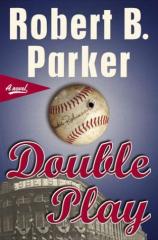Double Play
Review
Double Play
The first Robert B. Parker novel that I ever read was MORTAL STAKES, the third of the Spenser books. The book concerned, along with many other things, professional baseball, and even at the early point in the series Parker's and Spenser's wit was razor-sharp. References were made in those early books to Spenser's service in World War II, something that, uh, isn't referenced much anymore, given that Spenser would be in his early 80s by now and probably not in any shape to be pimpslapping the occasional villainous cad he might encounter. I kept coming back to Spenser's forgotten military service, however, as I read DOUBLE PLAY.
DOUBLE PLAY is not in the Spenser continuum, nor in the worlds of Randall or Stone. It is set in 1947, an era to which Parker is no literary stranger, due to his fine novels POODLE SPRINGS and PERCHANCE TO DREAM. DOUBLE PLAY is in its fashion a historical novel. As Parker so aptly puts it in a short note at the commencement of the book, DOUBLE PLAY is a work of fiction about a real man. The man in question is Jackie Robinson, the first black American to play in what has come to be known as Major League Baseball. That feat was perhaps one of the most significant occurrences of the 20th century with respect to the Civil Rights movement, arguably equaled by the unabashed appeal of Louis Armstrong to white audiences. DOUBLE PLAY, however, is told from the perspective of Joseph Burke, a troubled man whose path makes an unlikely crossing with Robinson's on the eve of the latter's shattering of the color barrier in professional sports.
Burke is a World War II veteran, a marine who survived, though barely, the battle of Guadalcanal. Returning home to an empty house and life, Burke, like Spenser before him, becomes a professional boxer but soon finds that he is almost good, in a sport where such a level of competency is simply not good enough. After being employed for a short time as a "collection agent" for an unsavory character, Burke is hired as a bodyguard by Julius Roach for his daughter Lauren, who, in the words of Roach, needs "looking after." This indeed is an understatement. Lauren is trouble, yet Burke is attracted to something within Lauren, and the two begin an unlikely but perhaps inevitable relationship.
When Burke's employment, and his relationship with Lauren, is terminated, Burke is passed off to a man named Branch Rickey. Rickey is on the verge of presenting Jackie Robinson to the world as the first black professional baseball player. Robinson has been receiving death threats on an almost daily basis; Rickey feels that Robinson needs protection, as well as a guardian angel, as it were, to keep him out of trouble. The message, though implied, is clear: in order for Robinson to succeed, he does not need to be as good as his white counterparts. He needs to be better, on and off the field.
Burke and Robinson accordingly begin a relationship that is, if anything, even more unlikely than Burke's star-crossed relationship with Lauren. The men have some initial difficulty --- white cab drivers won't pick them up because of Robinson and black cabdrivers won't pick them up because of Spenser, for example --- but the men soon develop a relationship based on mutual respect and the similarity of their circumstances. They are both fish out of water, doing the best that they can. It isn't long before they both make some people extremely angry. Burke foils one assassination attempt on Robinson's life, only to discover that an unhappy episode in Burke's past is now coming back on him and is endangering Robinson as well. Burke is not what one would necessarily call a smart man, but he is very clever. And he has a plan that will not only remove the threat to himself and to Robinson, but also resolve his own unfinished business of the heart.
I had the feeling while reading DOUBLE PLAY that the character of Burke might be based in part on Parker's private vision of Spenser's history --- his "hidden years," if you will --- prior to becoming a private investigator. There are similarities between the two characters --- the self-confidence, the military and pugilistic backgrounds, the quiet but deep caring that runs through both men --- but there are differences as well. It is doubtful that Burke knows that there is a spelling of Spenser "like the poet," though we do learn, albeit very briefly, that Burke is a reader; we just never learn what he has been reading. Nor does Burke possess Spenser's refinement. It is these differences, and others, between the two characters that keep DOUBLE
PLAY, it is worth reading for its quiet yet forthright historical value alone.
--- Reviewed by Joe Hartlaub
• Click here now to buy this book from Amazon.
Review by Ron Kaplan

Robert B. Parker's heroes epitomize the strong silent types. Like the cowboys of old, they are taciturn, unfailingly loyal and determined to pursue the causes of right in the face of superior numbers or disadvantageous circumstances.
Joseph Burke is the latest in this mold.
Parker, known primarily for his Spenser novels, takes a stab (no pun intended) at the noir and historical fiction genres in DOUBLE PLAY.
Burke, a wounded WWII veteran, has little to live for. His wife left him after his return to the States. His recovery is slow and painful, though he doesn't complain. This makes him the perfect guy for a series of dubious opportunities where a cheery or promising outcome isn't necessary.
After a succession of jobs calling for a degree of physical prowess combined with a generous helping of discretion, Burke winds up as bodyguard for a very important person: Jackie Robinson, the African-American who broke baseball's color line with the Brooklyn Dodgers in 1947.
One of the codicils to which Robinson had to agree in his first two years in the big leagues was to turn the other cheek in the face of beanballs, threats, spikings by opponents and the cold shoulders of some of his own teammates. To retaliate, the Dodgers worried, would give ammunition to those who supported the notion that blacks weren't ready to play in the majors.
While life on the field was no picnic, at least Robinson was able to channel his energies through baseball. His teammates grew to respect and protect him. It was during those long hours after the final out that Burke's special skills are needed.
There aren't a lot of actual baseball aspects to the book, but Parker does a credible job of relating the omnipresent tension Robinson faced, painting a very sympathetic picture and making Burke's course clear.
DOUBLE PLAY mixes many clichés from noir classics such as THE BIG SLEEP --- the spoiled rich girl who invariably falls for the hero; the bad-guy competition who shares a mutual, if begrudging, admiration with Burke; the wealthy and cowardly villain who has others do his dirty work, etc. Throw in the race card and you now have rival gangs competing for turf.
Mixed in with the narrative are "pentimenti," which serve as back story/flashback, explaining how Burke came to his current situation. Parker also slips in "Bobby" chapters without any explanation at all. Are these his own memories as a young boy, serving as a rationale for writing this novel? Are they those of a fictional character? Either way, they might strike some as intrusive and unnecessary.
Parker's latest is another example of his courage to try new things. In addition to the Spenser books, he created two other series: Sunny Randall, featuring a female detective, and Jesse Stone, a small town police chief. Further reaching outside his comfort zone, he wrote GUNMAN'S RHAPSODY, a western novel featuring Wyatt Earp, and took it upon himself to write "sequels" to some of Raymond Chandler's novels.
While Parker's Spenser books are much more detail-oriented (for some reason, he has a mania for describing the most minute details of the characters' food preparation and clothing), DOUBLE PLAY is stark by comparison, mirroring the bleakness characteristic of this genre.
--- Reviewed by Ron Kaplan (ronk23@aol.com)
Reviewed by Joe Hartlaub and Ron Kaplan (ronk23@aol.com) on May 24, 2004
Double Play
- Publication Date: May 24, 2004
- Genres: Fiction
- Hardcover: 304 pages
- Publisher: Putnam Adult
- ISBN-10: 0399151885
- ISBN-13: 9780399151880





